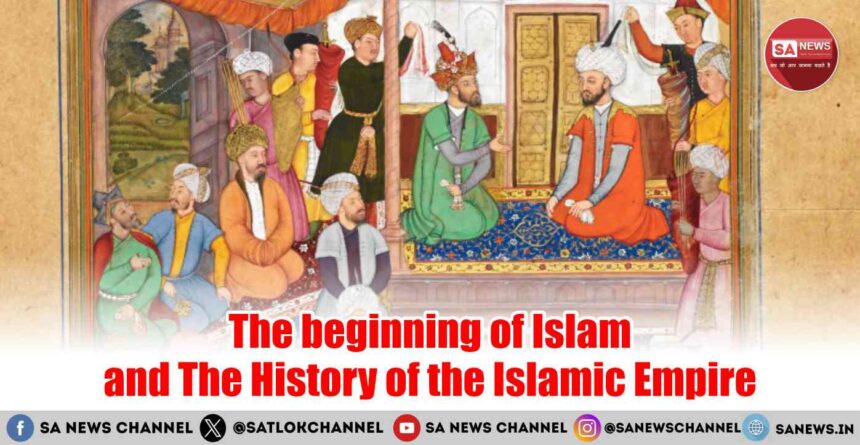Breathtaking Story of Islam Empire: The story of the Islamic Empire is a breathtaking journey that spans over a millennium. It’s a tale filled with spiritual awakening, scientific brilliance, cultural exchange, and political intrigue. From the sands of Arabia to the palaces of Spain, from the scholars of Baghdad to the courts of India the rise and legacy of the Islamic Empire shaped the world as we know it today. Let’s know the history of the Islamic Empire, from its humble beginnings to its global influence.
- The Birth of Islam and the Rashidun Caliphate (610–661 CE)
- The Umayyad Caliphate (661–750 CE): Expansion and Empire Building
- The Abbasid Caliphate (750–1258 CE): The Islamic Golden Age
- A Golden Age of Knowledge
- A Mosaic of Cultures: Coexistence and Trade
- Crusades and Mongol Invasions: Conflict and Collapse
- The Rise of the Gunpowder Empires (16th–18th Century)
- Colonialism and the Decline of Islamic Power
- The Enduring Legacy of the Islamic Empire
- Why Does the History of the Islamic Empire Still Matters?
- Spiritual Perspective which Matters Even Today
- FAQs on the History of Islamic Empire
- 1. When and how did the first Islamic empire form?
- 2. What was the primary Islamic empire throughout history?
- 3. What were Islamic empire’s benefits to wisdom and culture?
- 4. What caused the decline of Islamic empire?
- 5. What impact did Islamic armature have on the world?
- Connect With Us on the Following Social Media Platforms
The Birth of Islam and the Rashidun Caliphate (610–661 CE)
The Islamic Empire finds its roots in the early 7th century with the life of Prophet Muhammad. Born in Mecca in 570 CE, he received divine revelations at the age of 40, which would later be compiled into the “Qur’an”, the holy book of Islam.
Suggestion: Must read the detailed Life History of Prophet Muhammad with His Teachings
and the beginning of Islam.
Following his death in 632 CE, leadership passed to the Rashidun Caliphs—the “Rightly Guided” successors:
- Abu Bakr
- Umar ibn al-Khattab
- Uthman ibn Affan
- Ali ibn Abi Talib
These leaders expanded Islamic rule beyond Arabia, spreading it across the Byzantine and Sassanian empires. But their vision went beyond conquest—it was about creating a just, ethical, and spiritually driven society.
This period established:
- Systems of governance based on Shariah (Islamic law)
- A state treasury (Bayt al-Mal) to support welfare
- Codification of the Qur’an and religious guidance
The Umayyad Caliphate (661–750 CE): Expansion and Empire Building
The assassination of Ali sparked a major political shift. The Umayyads, under Muawiyah I, moved the capital to Damascus and created the first Islamic dynasty.
In under a century, the Umayyads built one of the largest empires in history stretching from:
- Spain (Al-Andalus)
- North Africa
- The Middle East
- Central Asia
- Parts of India
This rapid expansion was aided by:
- A strong, centralized administration
- Standardized currency and language (Arabic)
- Monumental architecture like the Dome of the Rock in Jerusalem
However, Arab favoritism caused friction with non-Arab Muslims (mawali), who demanded more inclusion and fairness leading to growing unrest.
The Abbasid Caliphate (750–1258 CE): The Islamic Golden Age
Fueled by resentment toward the Umayyads, the Abbasids rose to power and shifted the capital to Baghdad, founding one of history’s greatest centers of science, culture, and innovation.
A Golden Age of Knowledge
The Abbasid period (especially 8th to 11th centuries) is celebrated for its incredible intellectual and scientific contributions:
- The House of Wisdom (Bayt al-Hikmah): A major translation and research center
- Al-Khwarizmi: Father of algebra
- Ibn Sina (Avicenna): Master of medicine and philosophy
- Al-Razi: Pioneer of hospitals and chemistry
Baghdad, Cairo, and Córdoba became bustling centers where Muslim, Christian, Jewish, and Zoroastrian scholars exchanged ideas freely.
A Mosaic of Cultures: Coexistence and Trade
One of the most remarkable traits of the Islamic Empire was its multi-cultural, multi-religious fabric. Dhimmi (protected non-Muslims) communities lived under Islamic rule with rights to practice their faiths, run schools, and even participate in governance.
■ Also Read: British Raj: India’s Transformative Journey from Colonial Rule to Independence
Major trade routes like the Silk Road, Trans-Saharan route, and Indian Ocean networks linked the empire to China, Africa, and Europe. Muslim merchants, scholars, and travelers spread not only goods but ideas, languages, and technologies across the globe.
Crusades and Mongol Invasions: Conflict and Collapse
Between the 11th and 13th centuries, the Islamic world faced intense external threats.
The Crusades:
Christian Crusaders seized Jerusalem in 1099, but were eventually repelled by Muslim leaders like Salahuddin al-Ayyubi (Saladin). His recapture of Jerusalem in 1187 and his honorable treatment of prisoners won him respect even in the West.
The Mongols:
In 1258, Hulagu Khan of the Mongols invaded and destroyed Baghdad, killing hundreds of thousands and obliterating the House of Wisdom. It was a devastating blow.
Yet, Islam survived. The Mongols themselves converted to Islam, and Muslim dynasties rose again in Persia, Central Asia, and Egypt (notably the Mamluks, who defeated the Mongols at Ain Jalut in 1260).
The Rise of the Gunpowder Empires (16th–18th Century)
With the fall of the classical Abbasid rule, new Islamic empires emerged using modern warfare, especially gunpowder weaponry.
- The Ottoman Empire (1299–1924)
- Conquered Constantinople in 1453, renaming it Istanbul
- Ruled Southeast Europe, North Africa, and the Middle East
- Preserved the Caliphate, becoming the symbolic leader of Sunni Islam
- Promoted architecture (e.g., Blue Mosque), art, and legal reform
The Safavid Empire (1501–1736)
- Based in Persia (modern Iran)
- Made Twelver Shiism the state religion
- Supported arts, poetry, and philosophy with Persian influence
The Mughal Empire (1526–1857)
- Ruled most of the Indian subcontinent
- Leaders like Akbar the Great promoted religious tolerance and pluralism
- Created wonders like the Taj Mahal
- Blended Persian, Indian, and Islamic cultures in governance, architecture, and literature
Colonialism and the Decline of Islamic Power
The 18th and 19th centuries saw Islamic empires begin to fragment under the weight of European imperialism. Technological superiority, economic pressure, and internal corruption weakened once-mighty states.
- British control over India
- French dominance in North Africa
- Dutch colonization in Southeast Asia
The Ottoman Empire, the last caliphate, collapsed after World War I. In 1924, the Caliphate was officially abolished by Mustafa Kemal Ataturk, founder of modern secular Turkey.
The Enduring Legacy of the Islamic Empire
Even though political unification ended, the Islamic Empire’s contributions remain deeply embedded in the modern world.
Contributions That Still Shape Us:
- Science & Math: Algebra, optics, surgery, astronomy
- Architecture: Domes, arches, minarets from Spain to India
- Law & Governance: Early human rights and social welfare systems
- Language: Arabic remains a sacred language and lingua franca in many regions
- Philosophy: Works by Ibn Rushd (Averroes) and Al-Ghazali continue to influence modern thought
Why Does the History of the Islamic Empire Still Matters?
The Islamic Empire was more than just a political force it was a civilizational superpower. It fostered a world where faith, reason, art, and diversity coexisted, often more harmoniously than in many parts of the modern world.
In a time where the world is again wrestling with division and cultural misunderstanding, the history of the Islamic Empire reminds us that a society can thrive when it embraces diversity, encourages learning, and balances faith with progress.
Whether you’re Muslim or not, this legacy is part of our shared human heritage and it’s one worth remembering, preserving, and learning from.
Spiritual Perspective which Matters Even Today
Islam was established in the 7th century CE by Prophet Muhammad in Mecca, as per godly exposures gathered in the Quran. Islam stressed deism, justice, and mercy and fleetly expanded throughout Arabia. Yet Baakhabar Sant Jagatguru Rampal Ji Maharaj presents a spiritual depth view of Islam’s onsets and end.
Although Islam steered in significant social reforms, some of its inner spiritual interpretations have been misinterpreted through the passage of time. Baakhabar Sant Rampal Ji Maharaj clarifies that deliverance (Moksha) can not be achieved by religious rituals but by deification of the Supreme God, as illustrated in Kabir Vani. He points out that the Quran has implicit spiritual wisdom which is in concordance with the training of Kabir Sahib, tutoring the way of pure devotion outside of worldly faiths.
Also, He says that many prophets, including Muhammad, were taken to Satlok, the eternal home of the Supreme God to show them their real place but Mohammed was uncertain with the facts told by Kabir Saheb ji. For a better appreciation of this great knowledge, the compendiums are encouraged to read the book “Musalman Nahi Samjhe Gyan Quran” by Bakhabar Sant Rampal Ji Maharaj ji, in which the original spiritual communication within the Quran has been revealed.
FAQs on the History of Islamic Empire
1. When and how did the first Islamic empire form?
The Islamic empire , the Rashidun Caliphate ( 632- 661 CE), was formed following the death of Prophet Muhammad. Led by the correctly Guided Caliphs, Islam spread extremely presto from Arabia to Persia, the Levant, and North Africa through vanquishing and tactfulness.
2. What was the primary Islamic empire throughout history?
Some of the most influential Islamic empire are the Rashidun Caliphate, Umayyad Caliphate, Abbasid Caliphate, Fatimid Caliphate, Seljuk Empire, Mamluk Sultanate, Ottoman Empire, Safavid Empire, and Mughal Empire. All of them contributed tremendously to Islamic civilization and world history.
3. What were Islamic empire’s benefits to wisdom and culture?
Islamic empire contributed significantly to drugs, mathematics, astronomy, gospel, and armature. The House of Wisdom in Baghdad was the center of intellectual exertion, and scholars such as Al- Khwarizmi (algebra father) and Avicenna (drug colonist) made revolutionary discoveries that impacted the European Renaissance.
4. What caused the decline of Islamic empire?
The cause of the decline of Islamic empire was due to internal conflicts, political paroxysms, profitable difficulty, European colonialism, and technological recession. The collapse of the Ottoman Empire in 1922 gestured the sanctioned termination of Islamic Homeric rule.
5. What impact did Islamic armature have on the world?
Islamic armature brought inventions similar to poles, minarets, complex geometric patterns, and penmanship. notorious structures similar as the Taj Mahal, Alhambra, and the Dome of the Rock demonstrate the cultural and engineering prowess of Islamic civilizations.









